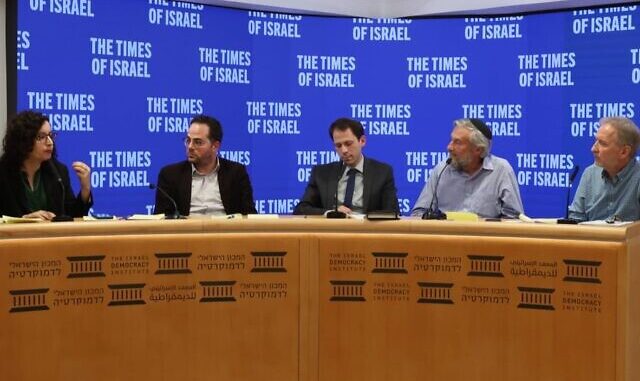T. Belman. I see a different aspect of the problem. Israel has passed Basic Laws but there is a disagreement whether are superior to ordinary laws. The concern seems to be that the override law will allow, infringement of rights.
Israel does not have a constitution. Therefore the “rights” are not defined in a constitution. They are derived by the Court from the Basic Law: Human Dignity and Liberty (1992)
“The basic human rights in Israel are based on the recognition of the value of the human being, the sanctity of his life, and his being a free person, and they shall be upheld in the spirit of the principles included in the Declaration of the Establishment of the State of Israel.”
“One should not violate the life, body, or dignity of a human being as such.”
When the Court overrules a law they usually hold that the law infringes on a person’s “dignity”. It alone decides what rights “dignity” encompasses. This is an overreach. It should be up to the Knesset to decide what rights are encompassed.
Experts opposed to a High Court override say existing power to strike down legislation is crucial to safeguarding democracy, scholars in favor decry court’s unchecked authority

From left: Dr. Tamar Hostovsky Brandes, Prof. Yaniv Roznai, Adv. Yonatan Green, Prof. Moshe Koppel and Times of Israel editor David Horovitz at a ToI Live event in Jerusalem’s Israel Democracy Institute, December 15, 2022. (Oded Antman/IDI)
Prominent legal scholars discussed the incoming coalition’s plans to curtail the High Court’s power during a Thursday event hosted and live-streamed by The Times of Israel, exploring its likely far-reaching impact on Israeli democracy and society.
Expected incoming prime minister Benjamin Netanyahu and his bloc of right-wing and religious parties plan to pass a High Court of Justice override law, which would effectively end the court’s ability to strike down legislation and reverse government decisions that violate fundamental rights laid out in Israel’s quasi-constitutional Basic Laws.
Legal experts opposed to the proposal argued the High Court’s ability to strike down legislation is critical for democracy, while those on the other side of the debate asserted that the lack of a legal basis for judicial review and the absence of constraints on the court itself was itself problematic.
The planned legislation, demanded by the Religious Zionist and United Torah Judaism parties as well as numerous Likud MKs, would likely allow the Knesset to re-legislate any such law or enact legislation with immunity from court review from the outset.
The Times of Israel event was live-streamed and held at the Israel Democracy Institute in Jerusalem.
Prof. Amichai Cohen, a Senior Fellow at the IDI’s Center for Security and Democracy, outlined the evolution of the court’s process for judicial review, which is not anchored in any law.
Cohen explained that from the beginning of the state, the court had review over administrative decisions, and since the country was governed by the Mapai party for the first few decades, most major decisions were of an administrative nature and the lack of review over legislation was less important.
Following the electoral victory of the Likud party in 1977, as well as growing societal tensions between different parts of the population, the Knesset became the locus of power, and the High Court assumed judicial review in a landmark ruling in 1995 following the passage of Basic Law: Human Dignity and Liberty in 1992.
Constitutional scholar Prof. Yaniv Roznai of Reichman University at the debate contended that a High Court override law would allow the Knesset to negate fundamental rights established over the course of several centuries through the adoption of historic charters on civil rights.
<
>
Roznai conceded that in theory that a legislative body could be allowed the ability to overrule the courts on issues of basic rights, but argued such a framework would require a full constitutional structure including a bill of rights.
Israel does not have a constitution, but its quasi-constitutional Basic Laws underpin the legal system and are more difficult to repeal than regular laws.
“I’m happy to adopt the judicial review mechanism of other democratic countries, but you have to bring their entire constitutional structure along with it. You can’t pick and choose items that give the government and legislature unlimited powers,” Roznai said.
Attorney Yonatan Green of the Israel Law and Liberty Forum disagreed, asserting that the court had assumed the power of judicial review without any legal authorization and claiming the court’s “final say” over law in the country is “unthinkable, unjustifiable and untenable.”
Green also contended that the court had for the most part intervened on issues of government policy that had no relation to any fundamental rights, pointing to a decision to strike down a policy of not granting some welfare payments if the applicant owned a car.

“Is this an inalienable right which the court needs to uphold?” Green asked.
Prof. Moshe Koppel, founder of the conservative Kohelet Policy Forum, objected to what he said was the unchecked and unbalanced power of the court, which he said has decided that every issue is justiciable and that anyone has the standing to petition the court.
“I am sympathetic to the idea that there should be barriers to legislation, but do you get from there to saying that the court can authorize itself to be a barrier to legislation? Judicial review is perfectly reasonable as long as it the judicial branch is subject to checks and balances,” Koppel said.
Dr. Tamar Hostovsky Brandes of the Ono Academic College Faculty of Law took issue with Koppel’s position, arguing that undermining the powers of the courts is a common tactic adopted by regimes that seek to restrain democratic rights, citing the governments in Poland and Hungary as examples.
“The type of power courts have is very different to that of governments and legislatures. I don’t recall a country where a court turned a democracy into an autocracy, but I can think of many governments which have done just that,” Hostovsky Brandes said.
Following the panel was a smaller discussion involving representatives of organizations that have petitioned the High Court to protect the rights of specific groups and individuals and who view the override clause as the death knell for the ability to defend such people from the power of the state.
The panel included Attorney Shlomit Ravitsky Tur-Paz, the director of the IDI’s Religion and State Program and a co-founder of the ITIM religious services advisory organization, and rabbi and attorney Noa Sattath, Executive Director of the Association for Civil Rights in Israel.
Sattath detailed the frequent petitions to the High Court made by ACRI over the years, including on behalf of African asylum seekers, Palestinian land owners, and other vulnerable groups.
She rejected Green’s assertion that fundamental civil and human rights were not at stake, pointing to her organization’s requests to the High Court on issues pertaining to unjust incarceration, property rights and freedom of expression.<
And Sattath detailed some aspects of civil liberties which could come under threat should the override law pass.
She expressed concern that laws regarding the incarceration of asylum seekers, the expropriation of private Palestinian land, and restrictions on freedom of expression could all be revived.
Sattath also noted that political parties representing Arab Israeli citizens have been banned by the Central Elections Committee in every election for the last quarter of a century, only to have the decision overturned by the Supreme Court.
“We are extremely worried that if judicial oversight is removed Palestinian [Arab] society in Israel will have no political representation,” she said.
“[Religious Zionism leader MK Bezalel] Smotrich has called NGOs an ‘existential threat to Israel,’ and laws have been passed making it more difficult for NGOs to receive and raise funds which could have a devastating effect on them due to their limited resources,” she said.



I sent a text to MK Rothman which included this paragraph,.
I wanted him to consider defining “dignity” as another means to limit the Court.
Likud includes Override Clause in agreements, but in vague terms